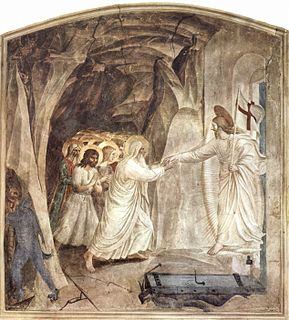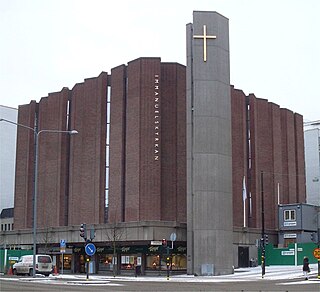
The Acts of Union were two Acts of Parliament: the Union with Scotland Act 1706 passed by the Parliament of England, and the Union with England Act passed in 1707 by the Parliament of Scotland. They put into effect the terms of the Treaty of Union that had been agreed on 22 July 1706, following negotiation between commissioners representing the parliaments of the two countries. By the two Acts, the Kingdom of England and the Kingdom of Scotland—which at the time were separate states with separate legislatures, but with the same monarch—were, in the words of the Treaty, "United into One Kingdom by the Name of Great Britain".

Sola fide, also known as justification by faith alone, is a Christian theological doctrine commonly held to distinguish many Protestant churches from the Catholic Church, as well as the Eastern Orthodox Churches and Oriental Orthodox Churches.

The Salvation Army (TSA) is a Protestant Christian church and an international charitable organisation. The organisation reports a worldwide membership of over 1.7 million, consisting of soldiers, officers and adherents collectively known as Salvationists. Its founders sought to bring salvation to the poor, destitute, and hungry by meeting both their "physical and spiritual needs". It is present in 131 countries, running charity shops, operating shelters for the homeless and disaster relief and humanitarian aid to developing countries.

The Kingdom of Great Britain, officially called simply Great Britain, was a sovereign state in western Europe from 1 May 1707 to 31 December 1800. The state came into being following the Treaty of Union in 1706, ratified by the Acts of Union 1707, which united the kingdoms of England and Scotland to form a single kingdom encompassing the whole island of Great Britain and its outlying islands, with the exception of the Isle of Man and the Channel Islands. The unitary state was governed by a single parliament and government that was based in Westminster. The former kingdoms had been in personal union since James VI of Scotland became King of England and King of Ireland in 1603 following the death of Elizabeth I, bringing about the "Union of the Crowns". After the accession of George I to the throne of Great Britain in 1714, the kingdom was in a personal union with the Electorate of Hanover.

The Acts of Union 1800 were parallel acts of the Parliament of Great Britain and the Parliament of Ireland which united the Kingdom of Great Britain and the Kingdom of Ireland to create the United Kingdom of Great Britain and Ireland. The acts came into force on 1 January 1801, and the merged Parliament of the United Kingdom had its first meeting on 22 January 1801.

The Flag of Scotland consist of a white saltire in a blue field. As the national flag, the Saltire, rather than the Royal Standard of Scotland, is the correct flag for all individuals and corporate bodies to fly. It is also, where possible, flown from Scottish Government buildings every day from 8am until sunset, with certain exceptions.

The national flag of the United Kingdom is the Union Jack, also known as the Union Flag.

In Christian theology, justification is God's act of removing the guilt and penalty of sin while at the same time making a sinner righteous through Christ's atoning sacrifice.
In the United Kingdom, representative peers were those peers elected by the members of the Peerage of Scotland and the Peerage of Ireland to sit in the British House of Lords. Until 1999, all members of the Peerage of England held the right to sit in the House of Lords; they did not elect a limited group of representatives. All peers who were created after 1707 as Peers of Great Britain and after 1801 as Peers of the United Kingdom held the same right to sit in the House of Lords.

The Free Church of Scotland was a Scottish denomination which was formed in 1843 by a large withdrawal from the established Church of Scotland in a schism or division known as the Disruption of 1843. In 1900 the vast majority of the Free Church of Scotland joined with the United Presbyterian Church of Scotland to form the United Free Church of Scotland. The House of Lords judged that the minority continuing after the 1900 union were entitled to all the assets. While the denomination clearly had a starting date, in their own eyes their leaders had a legitimate claim to an unbroken succession of leaders going all the way back to the Apostles.

General Evangeline Cory Booth, OF was a British theologist and the 4th General of The Salvation Army from 1934 to 1939. She was the first woman to hold the post of General.

The Treaty of Union is the name usually now given to the agreement which led to the creation of the new state of Great Britain, stating that England and Scotland were to be "United into One Kingdom by the Name of Great Britain", At the time it was more often referred to as the Articles of Union.

The Mission Covenant Church of Sweden, founded in 1878, was a Swedish Reformed free church. It was the second-largest Christian denomination in Sweden, after the national church, the Church of Sweden. In 2011–2012, the Mission Covenant Church of Sweden completed a long-planned merger with the Baptist Union of Sweden and the United Methodist Church of Sweden. The new denomination was called Joint Future Church, until the new name Equmeniakyrkan was adopted by the general assembly in May 2013.

The West Port is a street in Edinburgh's Old Town, Scotland, located just south of Edinburgh Castle. It runs from Main Point down to the south west corner of the Grassmarket. Its name derives from the fact it sloped up from the town gate named the West Port, which was the only westwards exit from the city when the city walls stood, allowing passage through the Flodden Wall. The port itself was demolished in 1786.

Great Britain is an island in the North Atlantic Ocean off the northwest coast of continental Europe. With an area of 209,331 km2 (80,823 sq mi), it is the largest of the British Isles, the largest European island, and the ninth-largest island in the world. In 2011, Great Britain had a population of about 61 million people, making it the world's third-most populous island after Java in Indonesia and Honshu in Japan. The island of Ireland is situated to the west of Great Britain, and together these islands, along with over 1,000 smaller surrounding islands, form the British Isles archipelago.

The formation of the United Kingdom of Great Britain and Northern Ireland has involved personal and political union across Great Britain and the wider British Isles. The United Kingdom is the most recent of a number of sovereign states that have been established in Great Britain at different periods in history, in different combinations and under a variety of polities. Norman Davies has counted sixteen different states over the past 2,000 years.
In its widest sense, the phrase union with Christ refers to the relationship between the believer and Jesus Christ. In this sense, John Murray says, union with Christ is "the central truth of the whole doctrine of salvation." The expression "in Christ" occurs 216 times in the Pauline letters and 26 times in the Johannine literature. Hence, according to Albert Schweitzer, "This 'being-in-Christ' is the prime enigma of the Pauline teaching: once grasped it gives the clue to the whole." Given the large number of occurrences and the wide range of contexts, the phrase embodies a breadth of meaning.
The public domain consists of all the creative works to which no exclusive intellectual property rights apply. Those rights may have expired, been forfeited, expressly waived, or may be inapplicable.
The Reverend James Wood was a Scottish editor and Free Church minister. He was born in Leith and studied at the University of Edinburgh, living most of his life in Edinburgh. His admiration for Thomas Carlyle and John Ruskin may have contributed to his failure to secure a ministry. Instead he earned a living as a writer. He translated Auguste Barth's Religions of India and edited Nuttall's Standard Dictionary, The Nuttall Encyclopaedia, Warne's Dictionary of Quotations, Bagster & Sons' Helps to the Bible, and a Carlyle School Reader. In 1881 he published anonymously The Strait Gate, and Other Discourses, with a Lecture on Thomas Carlyle, by a Scotch Preacher. He is described by P. J. E. Wilson as " that most conscientious of pedants".
The Nuttall Encyclopædia: Being a Concise and Comprehensive Dictionary of General Knowledge is a late 19th-century encyclopedia, edited by Rev. James Wood, first published in London in 1900 by Frederick Warne & Co Ltd.














